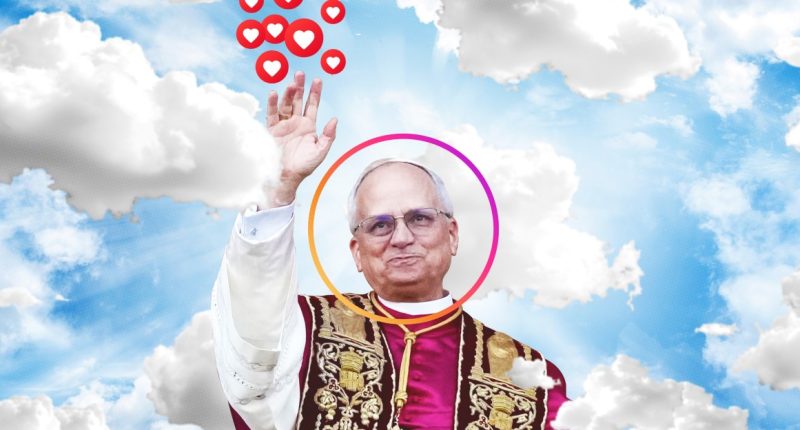Share this @internewscast.com
The moment I saw white smoke rising from the Sistine Chapel, I turned on the television to find out who the new pope was and then quickly checked social media, knowing I could learn about the new pope faster online and anticipating some good memes as well.
The memes appeared right away, faster and more abundantly than with Pope Francis, partly because the new pope was American. Specifically, Robert Francis Prevost, now Pope Leo XIV, hailed from Chicago, with a background rich in cultural references that the American meme world quickly seized: Did the pope ever try Malort? Was he a Cubs or a Sox fan? Would God now favor the Knicks in the NBA playoffs since the pope graduated from Villanova? Information about his upbringing, pastoral history, and religious views was sure to follow, revealing what kind of leader he might be.
Soon after, someone I followed shared a screenshot from an account with the handle @drprevost: three retweets from the past three months linking to articles harshly criticizing Donald Trump’s immigration policies. Although not directly from then-Cardinal Prevost, they still offered a glimpse into his thoughts and intentions: a brief, unguarded glimpse that spoke volumes about the new pope’s personal views. He didn’t seem to have time to clear his social media, I thought, anticipating a significant MAGA backlash. The pope only has about an hour, if that, between being chosen and introducing himself to the world—definitely not enough time to tidy up his online presence.
And then I paused. Wait. Why am I thinking about the POPE cleaning up his timelines?
I’m not a Catholic, and didn’t grow up one. The best description of my religious affiliation is probably “lapsed Buddhist.” But I’ve always been intrigued by the Catholic Church as an institution: its deep history, its vast theology, its artistic influence and societal dominance, the internal politics and external diplomacy of the modern Vatican. I sometimes joke that I treat and exoticize Catholicism the same way that white men exoticize Japan, but my fascination itself is sincere: I am astonished that somehow, the Vatican has maintained its mysticism in the modern era — an earthly waypoint between the physical and the divine.
Which is why I still have a hard time wrapping my head around the fact that less than two hours into his papacy, I learned more about the pope through his digital footprint than I did through the information filtered through Vatican press releases or interviews with his friends and family.
I learned from his retweets (and the discourse around the retweets) that he supported gun control legislation and Syrian refugees, opposed the repeal of DACA, condemned the 2017 massacre at Charlottesville, and called on Trump to support climate change legislation. I learned that he’d written a book on religious statistics (available on JSTOR). I learned from one post that he’d been a registered Republican, only to learn moments later that Illinois doesn’t have partisan voter registration. (The Washington Free Beacon reports that Leo XIV has previously voted in Republican primaries.) I wouldn’t have been surprised if someone posted a screenshot of the pope’s Venmo transactions.
And then I came across something more intimate: Pope Leo XIV’s personal Facebook profile.
I didn’t even have to go digging for it. A friend of mine who’d attended an Augustinian high school sent it to me, because it was apparently going viral among people who’d attended Augustinian educational institutions, because everyone who ever went to an Augustinian school in the United States somehow knows someone who knows him. Robert Prevost’s account is currently set to private — wild, because 68-year-olds rarely set their Facebook accounts to private by default — but there is one public photo available: the future Pope Leo XIV, wearing aviators and a black windbreaker, atop a pony. That’s a meme right there, thought my horrible, earthly, secular mind.
Without thinking about it, I copied the link and nearly sent it to a group chat, before catching myself in disgust. Viral or not, this was the private account of a man who’d had some degree of a private life when he got out of bed this morning, and clearly had not anticipated being elected pope. Anyone who harbored the ambition of becoming the spiritual leader of 1.4 billion people worldwide would, at a minimum, probably make sure his socials were secure — that his 172 Facebook friends were masked from the rest of the world, or that his retweets from 2017 wouldn’t set off a diplomatic firestorm from an impulsive president or a spiteful vice president — before he surrendered his electronic devices at the conclave.
I don’t think I would have paused to send that social media profile if it had belonged to anybody else: a politician, a celebrity, a coworker whom I didn’t know well, a blind date who needed vetting. And there’s a strong argument to be made that mining any public figure’s digital activity is fair game, particularly if they’re political leaders held to some degree of accountability. Venmo requests are enough to tank congressmen’s careers. Old tweets can land someone in hot water in the present day. Finding a former Fox News anchor’s phone number linked to a public Google Reviews account can indicate a massive national security crisis.
The moment you try to apply that standard to the freaking pope, though, the logic just grinds to a halt — not because a world leader shouldn’t be held to this standard, but because it is utterly baffling that one can even mine the socials of the Vicar of Christ. In fact, it’s baffling to think that a religious figure could be subjected to scrutiny of their internet history, or that they possess something as anodyne as a digital footprint — particularly someone inheriting a role that supposedly dates back to the time of Jesus and was established by Saint Peter the Apostle, whose predecessors are ancient saints and medieval rulers, and who claims the title of God’s representative on Earth, according to the 1.4 billion members of the church he leads.
Maybe obsessing over the pope’s retweets is a uniquely secular, American way to assess an American pope — not through his leadership of the Order of Saint Augustine or his ministerial work in Peru, but through his voting record, sports loyalty, or whether he’s retweeted mean things about the President. (We are a very tribalist nation that only thinks about things through the lens of being American.) We are now collectively engaged in mining the metadata of Pope Leo XIV’s former life for clues as to the direction of his papacy just as much as we are trying to divine meaning from his choice of regnal name and the thirteen Leos that came before him. Frivolous or not, the digital history of a religious figure is now a thing that exists.






